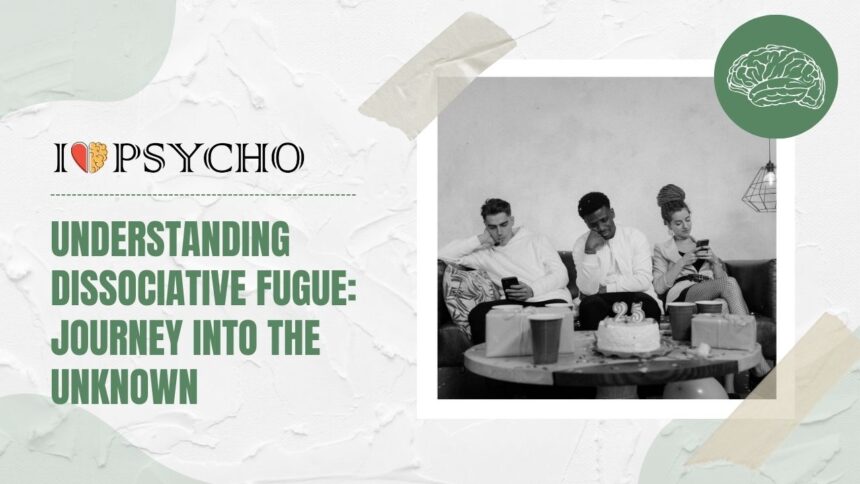Embark on a mysterious journey into the depths of the mind, where reality becomes a blurred landscape and identity slips through our fingers like sand. Dissociative Fugue, a captivating yet perplexing mental phenomenon, invites us to explore the enigmatic realm of wandering souls and lost memories. Join me as we unravel the secrets behind this intriguing condition and discover the resilience that lies within those who traverse its uncharted territories.
What is Dissociative Fugue?
Dissociative Fugue, a rare and intriguing mental health disorder, is characterized by sudden episodes of wandering or travel coupled with memory loss surrounding one’s identity and past. During a fugue state, individuals may unexpectedly embark on journeys without awareness of who they are or where they come from. It’s as if the very essence of their being has been temporarily obscured by a fog of confusion.
This dissociative amnesia can lead to perplexing situations where individuals find themselves in unfamiliar places with no recollection of how they got there. These fugue episodes can last for hours, days, or even longer periods, leaving loved ones bewildered and concerned about the safety of those affected. The elusive nature of Dissociative Fugue adds an element of mystery to an already complex condition that challenges our understanding of consciousness and memory.
As we delve deeper into the intricacies of Dissociative Fugue, we uncover a world where reality blurs with fiction, and the self becomes fragmented like pieces of a shattered mirror reflecting distorted images back at us.
Symptoms and Characteristics of Dissociative Fugue
Dissociative Fugue is a complex mental health condition characterized by sudden, unexpected travel or wandering away from home. Individuals experiencing this phenomenon may forget their past identity and take on a new one, often with no memory of their previous life. Symptoms can include confusion about personal identity, feeling detached from oneself, and experiencing amnesia surrounding the fugue episode.
During a dissociative fugue episode, individuals may exhibit disorientation, perplexity about their surroundings, and may struggle to recall important personal information. This state of detachment can be distressing for both the person affected and those around them. It’s essential to recognize these symptoms early to seek appropriate help and support.
Understanding the symptoms and characteristics of Dissociative Fugue is crucial in providing effective treatment and care for individuals facing this challenging condition. By raising awareness about these signs, we can promote empathy, understanding, and guidance for those navigating through the unknown territory of dissociation.
Causes of Dissociative Fugue
The causes of Dissociative Fugue are complex and not fully understood. It is believed to be triggered by severe stress or trauma, causing a disconnect between one’s thoughts, identity, and memories.
Some potential factors that may contribute to the development of Dissociative Fugue include childhood trauma, such as abuse or neglect, as well as experiencing a traumatic event later in life.
Genetic predispositions and certain personality traits may also play a role in the onset of this dissociative disorder. Additionally, high levels of emotional distress or overwhelming life events can act as catalysts for someone to enter a fugue state.
It’s important to note that each individual’s experience with Dissociative Fugue is unique, and what triggers one person may not affect another in the same way. Understanding these potential causes can help individuals seek appropriate treatment and support.
Famous Cases of Dissociative Fugue
Imagine a world where one day you wake up in a different city, with no recollection of how you got there or who you are. This is exactly what happened to Benjaman Kyle, a man found unconscious behind a Burger King in 2004. He had no memory of his past life and struggled to piece together his identity.
An intriguing case is that of Ansel Bourne, who in the late 1800s experienced multiple episodes of dissociative fugue. During one episode, he left his family and started a new life as J.W. Wilmore before regaining consciousness with no memory of his time as Wilmore.
Another famous case is that of Agatha Christie, the renowned mystery writer who disappeared for 11 days under mysterious circumstances. She later claimed amnesia due to fugue state brought on by personal turmoil.
These cases shed light on the complexity and unpredictability of dissociative fugue episodes, leaving us pondering the mysteries of the human mind.
Treating and Managing Dissociative Fugue
When it comes to treating and managing dissociative fugue, the first step is typically seeking professional help. Therapy, such as cognitive behavioral therapy or dialectical behavior therapy, can be beneficial in addressing underlying issues that may contribute to the condition. Medication may also be prescribed to help manage symptoms like anxiety or depression.
Building a strong support system is crucial for individuals with dissociative fugue. Surrounding oneself with understanding friends and family members can provide a sense of stability during episodes of disassociation. Engaging in stress-reducing activities like meditation, yoga, or exercise can also aid in managing symptoms.
Creating a structured routine and setting realistic goals can help individuals regain a sense of control over their lives. It’s important to prioritize self-care and practice mindfulness techniques to stay grounded in the present moment. Remember, recovery from dissociative fugue is possible with dedication and perseverance towards healing.
Coping Strategies for Individuals with Dissociative Fugue
Navigating life with dissociative fugue can be challenging, but there are coping strategies that individuals can incorporate into their daily routines to help manage the symptoms. Creating a structured schedule and sticking to it can provide a sense of stability and control amidst the uncertainty that comes with dissociative episodes.
Engaging in relaxation techniques such as deep breathing exercises or mindfulness meditation can help reduce anxiety levels and promote emotional well-being. Journaling thoughts and feelings during periods of dissociation can aid in reconnecting with one’s sense of self and reality.
Seeking support from trusted friends, family members, or mental health professionals is crucial in developing a support system. Joining support groups or therapy sessions tailored for individuals with dissociative disorders can also offer validation and guidance on coping mechanisms.
Incorporating physical exercise into your routine can release endorphins, promoting overall mood improvement. Prioritizing self-care activities like getting enough sleep, eating nutritious meals, and practicing hobbies you enjoy can contribute to your overall well-being while living with dissociative fugue.
Misconceptions about Dissociative Fugue
Misconceptions about Dissociative Fugue often stem from a lack of understanding. Some may mistakenly believe that individuals experiencing this condition are faking their memory loss or intentional wandering. However, it’s important to recognize that Dissociative Fugue is a genuine psychological disorder.
Another common misconception is that people with Dissociative Fugue can easily snap out of it if they wanted to. In reality, the dissociation and memory loss experienced during a fugue episode are involuntary and not under the individual’s control.
There is also a misconception that individuals with Dissociative Fugue are dangerous or violent. This stereotype is unfounded as those with this disorder typically pose no harm to others during their episodes.
It’s crucial to dispel these misconceptions and instead offer support and understanding to those affected by Dissociative Fugue. By raising awareness and providing education, we can help break down the stigma surrounding this complex mental health condition.
Conclusion: Finding Hope and Support Through Treatment
Seeking help from mental health professionals is crucial in managing dissociative fugue. With the right therapy, medication, and support system in place, individuals can start their journey towards healing and recovery.
Remember that you are not alone in this battle. Reach out to trusted friends or family members for emotional support. Joining a support group can also provide a sense of belonging and understanding from those who have gone through similar experiences.
It’s important to be patient with yourself during this process. Recovery takes time, but with dedication and perseverance, it is possible to overcome dissociative fugue.
By taking the first step towards seeking treatment, individuals can find hope and build a brighter future ahead. Remember, there is light at the end of the tunnel – stay strong and keep moving forward on your path to healing.









